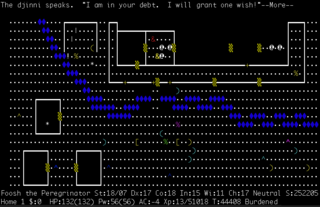
NetHack is an open source single-player roguelike video game, first released in 1987 and maintained by the NetHack DevTeam. The game is a fork of the 1982 game Hack, itself inspired by the 1980 game Rogue. The player takes the role of one of several pre-defined character classes to descend through multiple dungeon floors, fighting monsters and collecting treasure, to recover the "Amulet of Yendor" at the lowest floor and then escape.

Roguelike is a style of role-playing game traditionally characterized by a dungeon crawl through procedurally generated levels, turn-based gameplay, grid-based movement, and permanent death of the player character. Most roguelikes are based on a high fantasy narrative, reflecting their influence from tabletop role-playing games such as Dungeons & Dragons.
Ancient Domains of Mystery is a roguelike video game designed and developed by Thomas Biskup and released in 1994. The player's goal is to stop the forces of Chaos that invade the world of Ancardia. The game has been identified as one of the "major roguelikes" by John Harris.
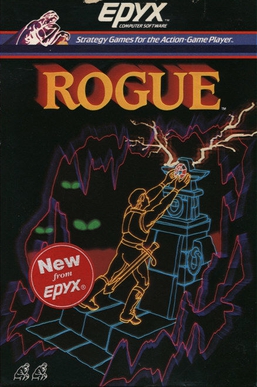
Rogue is a dungeon crawling game by Michael Toy and Glenn Wichman with later contributions by Ken Arnold. Rogue was originally developed around 1980 for Unix-based minicomputer systems as a freely distributed executable. It was later included in the Berkeley Software Distribution 4.2 operating system (4.2BSD). Commercial ports of the game for a range of personal computers were made by Toy, Wichman, and Jon Lane under the company A.I. Design and financially supported by the Epyx software publishers. Additional ports to modern systems have been made since by other parties using the game's now-open source code.
Hack is a 1984 roguelike video game that introduced shops as gameplay elements and expanded available monsters, items, and spells. It later became the basis for NetHack.
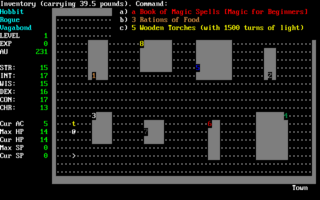
Angband is a dungeon-crawling roguelike video game derived from Umoria. It is based on the writings of J. R. R. Tolkien, in which Angband is the fortress of Morgoth. The current version of Angband is available for all major operating systems, including Unix, Windows, Mac OS X, and Android. It is identified as one of the "major roguelikes" by John Harris. Angband is free and open source game under the GNU GPLv2 or the angband license
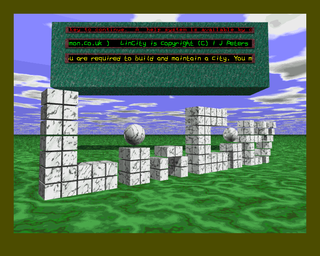
Lincity is a free and open-source software construction and management simulation game, which puts the player in control of managing a city's socio-economy, similar in concept to SimCity. The player can develop a city by buying appropriate buildings, services and infrastructure. Its name is both a Linux reference and a play on the title of the original city-building game, SimCity, and it was released under the GNU General Public License v2.
A text game or text-based game is an electronic game that uses a text-based user interface, that is, the user interface employs a set of encodable characters, such as ASCII, instead of bitmap or vector graphics.

Dark Sun: Wake of the Ravager is a role-playing video game developed and published by Strategic Simulations in 1994 for the MS-DOS operating system. It is the sequel to Dark Sun: Shattered Lands.
The operating system Linux can be used for playing video games. Because many games are not natively supported for the Linux kernel, various software has been made to run Windows games, such as Wine, Cedega, and Proton, and managers such as Lutris and PlayOnLinux. The Linux gaming community has a presence on the internet with users who attempt to run games that are normally not supported on Linux.

SuperTuxKart (STK) is a free and open-source kart racing game, distributed under the terms of the GNU General Public License, version 3. It features mascots of various open-source projects. SuperTuxKart is cross-platform, running on Linux, macOS, Windows, iOS (beta), Android systems and Nintendo Switch (homebrew).

Dungeon Crawl Stone Soup (DCSS) is a free and open source roguelike computer game and the community-developed successor to the 1997 roguelike game Linley's Dungeon Crawl, originally programmed by Linley Henzell. It has been identified as one of the "major roguelikes" by John Harris.

Falcon's Eye is a version of the roguelike video game NetHack which introduces isometric graphics and mouse control. Falcon's Eye has been praised for improving NetHack's visuals and audio to an almost commercial level and has been noted by Linux Journal as among the best free games available. After development stalled in 2001, the game was continued as Vulture's Eye and later Vulture for Nethack.
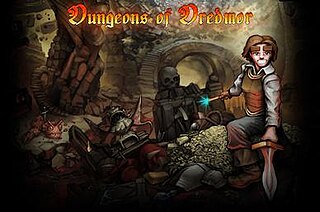
Dungeons of Dredmor is a roguelike indie video game released on July 13, 2011, by Gaslamp Games. A downloadable content (DLC) pack, "Realm of the Diggle Gods", was released later that year. A second DLC, "You Have To Name The Expansion Pack", was released on June 5, 2012, and a third, "Conquest of the Wizardlands", was released on August 1, 2012. The game has extensive support for user-created modifications.
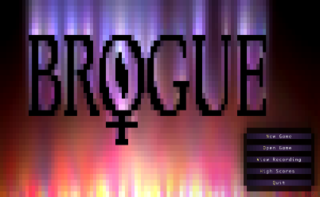
Brogue is a free roguelike computer video game created by Brian Walker. As in its predecessor Rogue, the goal of Brogue is for the player to descend to the 26th floor of the Dungeons of Doom, retrieve the Amulet of Yendor, and return to the surface. Players also have the option of delving deeper into the dungeon to obtain a higher score. This task is complicated by the presence of monsters and traps in a procedurally generated dungeon.
A roguelike deck-building game is a hybrid genre of video games that combines the nature of deck-building card games with procedural-generated randomness from roguelike games.
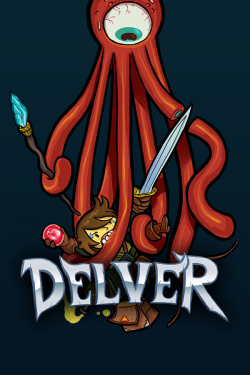
Delver is a 2018 first-person roguelike action dungeon crawler video game developed by Priority Interrupt. It was released for Microsoft Windows, macOS, and Linux on February 2, 2018.
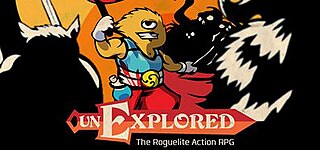
Unexplored is a series of two roguelike video games developed and published by Ludomotion. The first game, Unexplored, was released in 2017. The second game, Unexplored 2: The Wayfarer's Legacy, was released in 2022.













